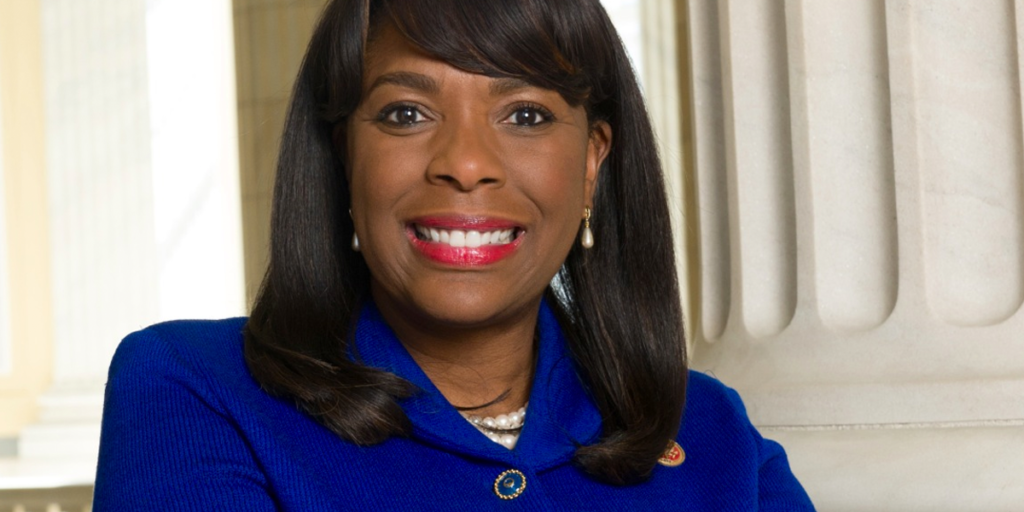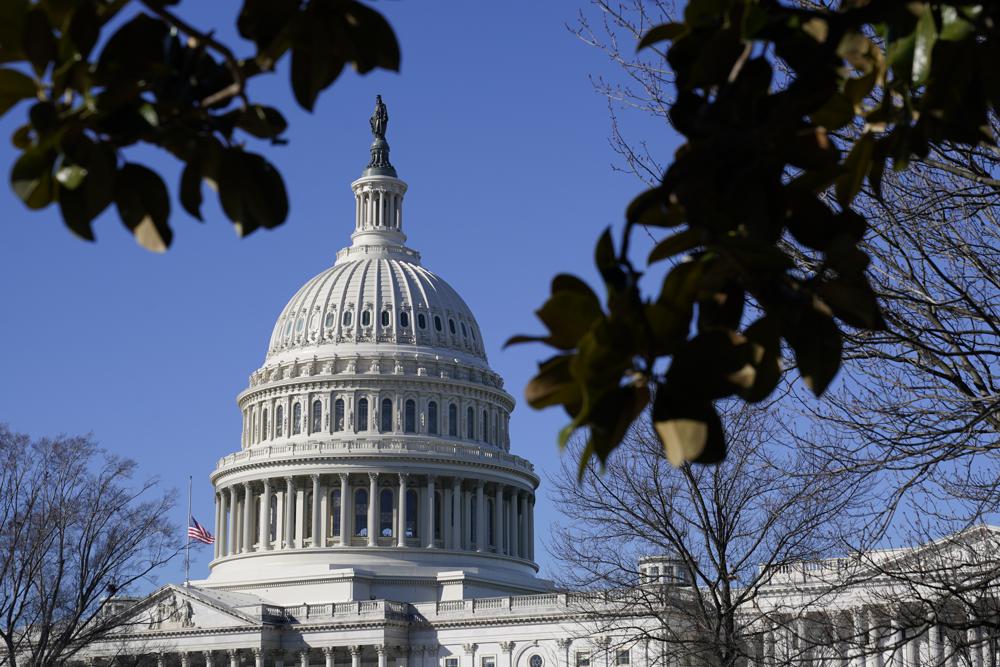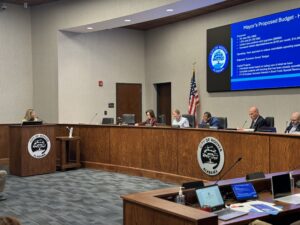Terri Sewell secures $42.8 million local projects in Omnibus bill

Congresswoman Terri Sewell announced on Friday that she had secured $42,820,760 for fifteen community projects in Alabama’s Seventh Congressional District in the final Fiscal Year 2023 omnibus government funding package. Sewell said that this funding responds directly to some of the most pressing needs in her Seventh Congressional District. “I am overjoyed to report that over $42 million in direct funding is on its way to Alabama’s 7th Congressional District from this year’s government funding package!” said Rep. Sewell. “My team and I have worked diligently all year to ensure that money for these fifteen projects gets included in the annual funding bill so that we can make our communities safer, stronger, and more prosperous. With this historic funding, we are responding directly to some of our district’s most pressing needs and reversing decades of disinvestment!” Sewell championed funding for fifteen projects that she says will directly benefit the residents of Alabama’s 7th Congressional District. These include: Jefferson County $4,000,000 for the Valley Creek Rails to Trails in Birmingham – Funding will be used to redevelop and construct a 4.57-mile recreation and transportation project for low-income city residents. $750,000 for the Bethel Baptist Church Family Child Care Center in Birmingham – Funding will be used to construct a multi-purpose community center providing child care and educational support for youth & families in a neighborhood that has experienced economic hardship and overall lack of investment for decades. $500,000 for the Birmingham-Southern College for experiential learning and civic engagement – Funding will be used to provide meaningful student support in higher education and strengthen the institution’s ability to facilitate placement in high-impact internships and jobs through multiple offerings of the Krulak Institute on campus. $2,000,000 for the Lovelady Center in Birmingham for facilities and equipment – Funding will be used to rehabilitate two dormitories, each housing 30 individual women. These two separate dormitories will be utilized as part of the intake process of the addiction recovery program. Montgomery County $4,000,000 for the City of Montgomery Blight Project – Funding will be used to redevelop blighted properties within the City of Montgomery and revitalize neighborhoods that have historically seen a lack of investment opportunities. $15,000,000 for the Commercial Vehicle Inspection Gate at Maxwell Air Force Base – Funding will be used to construct a commercial vehicle inspection and entry control facility area. This project will provide perimeter protection and security for Air Force personnel and assets, prevent unauthorized access, and maximize traffic flow. $6,800,000 for the F-35 Weapons Load Crew Training Facility at the Montgomery Regional Airport (ANG) Base – Funding will be used to construct a Weapons Load Crew Training facility utilizing conventional design and construction methods to accommodate the mission of the facility. This arrangement will improve the ability to train weapons load crews and certify their continued readiness. Dallas County $4,000,000 for the Selma Riverfront Multi-plex – Funding will be used to acquire, redevelop, and construct a center for essential public safety services accessible for all members of the community. $500,000 for the Orrville Public Library – Funding will be used for the construction of a new municipal public library providing access to educational resources for a historically underserved community. $1,500,000 for the Historic Brown Chapel AME Church Restoration – Funding will be used to stabilize the structure of the building to allow for further restoration of the sanctuary, bell towers, and brickwork. Marengo County $1,143,018 for the Tombigbee Healthcare Authority in Demopolis for facilities and equipment – Funding will be used to address many of the ongoing public health issues experienced in our region by providing high schoolers with the opportunity to rotate through the many clinical and non-clinical departments at the hospital. Wilcox County $595,041 for the J. Paul Jones Hospital, Camden, AL, for facilities and equipment – Funding will be used to modernize the hospital’s laboratory department to allow seamless communication with other data systems, reducing manual workload. Clarke County $1,000,000 for the Health Care Authority Corporation of the City of Thomasville, AL for facilities and equipment – Funding will be used to improve healthcare clinical outcomes in Thomasville and the larger Black Belt area of Alabama. The funding will provide basic and advanced treatments for many who otherwise lack access to such services and are prohibited by costs from traveling long distances to the otherwise closest providers. Greene County $521,100 for the Greene County Hospital and Nursing Home in Eutaw for facilities and equipment – Funding will be used to purchase and install two new generators, providing important protections and 24-hour care in the case of an emergency or power outage. Hale County $511,601 for the Alabama Emergency Management Agency for Hale County Storm Shelters – Funding will be used to construct six storm shelters in Hale County, Alabama. Many rural areas across Alabama’s Black Belt, including communities in Hale County, do not have access to storm shelters. The construction of these shelters would create a safe location for residents to seek shelter during severe storms. The twelve-bill government funding package also includes other initiatives championed by Sewell. “I’m thrilled that this package includes several of my own bills to strengthen and expand access to health care for Alabama’s rural communities,” Sewell said. “I know that these bills will make a big difference for our rural Alabamians and the health care providers who serve them.” The omnibus includes several health care bills led or co-led by Rep. Sewell. · H.R. 2454 – Protecting Access to Ground Ambulance Medical Services Act: The bill will ensure that ambulance service providers, including rural providers and those in underserved communities, are able to continue delivering quality critical first responder and health care services. It would extend the current temporary Medicare ground ambulance reimbursement increases of 2% urban, 3% rural, and the super rural bonus payments for five years and would ensure that rural zip codes continue to be classified as rural following the 2020 Census ZIP Code reclassification. · H.R. 2256 – Resident Physician Shortage Reduction Act: The omnibus includes language from Rep. Sewell’s Resident Physician Shortage Reduction Act which will address the nation’s physician shortage by adding 200 Medicare-funded graduate medical education (GME) residency positions. · H.R. 1887 – Rural Hospitals Support Act: The bill will provide a lifeline to rural hospitals by
Alabama’s top ten stories in 2022

2022 is winding down. Now is a good time to look back on the year that was and remember the political news that impacted our lives here in Alabama. Katie Britt wins the Senate. Britt had never held a public office before, was not a self-made multi-millionaire with her own corporation, was not a war hero, and was not a household name. Yet the mom from Enterprise managed to put together a diverse band of supporters that included among its ranks both the rich and powerful and thousands of just everyday ordinary Alabama folks. Alabama does not change Senators very often. Richard Shelby, whom she replaces, spent the last 44 years in Congress. At age 40, Britt is young enough to potentially duplicate that feat. Republicans hold onto their supermajorities in the Alabama Legislature. The Alabama Legislature is nationally recognized as the most conservative legislature in the entire country. Republicans entered the 2022 election cycle with the daunting challenge of defending 77 seats in the Alabama House of Representatives and 27 seats in the Alabama Senate. Alabama voters showed that they liked what the legislature did in the last four years and will enter the new quadrennium with the same historic filibuster-proof majorities they had in the previous four years. Republicans in the legislature can work across the aisle in the spirit of bipartisan cooperation if they want to. They can also ram through whatever red-meat agenda items that the GOP wants. Alabama Democrats in the legislature can do little to stop them. Alabama prisons are still horrible. Alabama prisons are overcrowded, woefully understaffed, do a poor job of rehabilitating prisoners, and according to a report by the Department of Justice, are the most dangerous in the country. This has all been well documented. The only conclusion that is possible to reach is that the people of Alabama just don’t care how we treat our prisoners. The Bureau of Pardons and Paroles has been hesitant to release prisoners. The state has 70, 80, and even 100-year-old prisons housing far more prisoners than they were designed to hold. The state has had to suspend executions because of botched attempts in which the state failed in its efforts to kill the condemned man. The state is trying to hire more prison guards, and the Alabama Department of Corrections has begun work on building two new mega prisons in Elmore and Escambia Counties. Time will tell if these efforts will satisfy the federal government, which is suing the state because they believe our prisons are so wretched that incarceration in Alabama constitutes a “cruel and unusual punishment” in violation of the Eight Amendment of the Bill of Rights. Kay Ivey was re-elected as governor. Ivey entered 2022 as the oldest governor in the country and one of the most popular. Ivey was challenged by a self-made millionaire, a former governor’s son, successful businessmen, a mayor and former legislator, a prison guard and former county commissioner, and a conspiracy theorist preacher in the Republican primary. They all blasted Ivey’s tenure as governor and said they could do a better job. The voters ignored millions of dollars in negative ads, rumors about the governor’s health, and her refusal to debate, and Ivey won the GOP primary without a runoff. Ivey then faced a woefully underfunded Democrat, a Libertarian, and two write-in candidates. Seventeen people ran for governor in 2022, and Ivey coasted to re-election. The Alabama Democratic Party imploded. America has a two-party system. Democrats have a one-seat majority in the U.S. Senate, and Republicans have a slim majority in the U.S. House of Representatives. Democrats won the presidential election in 2020, and Republicans won in 2016. Either party could be in charge in 2024. The nation could not be more evenly divided – not so in Alabama. Every Republican nominee for a statewide office prevailed in Alabama’s 2022, and it was not even close. In fact, the Republican domination surprised no one as only one Democrat, Doug Jones in 2017, has won a statewide race since 2008. The Alabama Democratic Party (ADP) was hemorrhaging money so badly that the state director and most staff quit weeks before the election. ADP Chairman State Rep. Chris England announced leadership elections before the elections and that he was not running again. Randy Kelley, deposed with the blessing of the Democratic National Committee in a bizarre ADP power struggle in 2019 as vice chair, was elected Chairman of the ADP in August. The Joe Reed and Alabama Democratic Conference-supported Chairman found the party with no money, weak candidates, no donors, and no hope. The party was effectively steamrolled outside of majority-minority Black legislative districts. Alabama legislature passed permitless carry. Despite the best efforts of anti-gun groups and the Alabama Sheriffs Association, constitutional carry passed the Alabama Legislature in 2022. Every Alabamian who still has their gun rights will be able to carry their handguns concealed on their person or in their vehicle without purchasing a permit from their local sheriff starting Sunday, January 1. The concealed carry bill was the most controversial item to pass the legislature in 2022. State Rep. Shane Stringer and State Sen. Gerald Allen successfully carried that legislation to the finish line. Legal medical marijuana moved much closer to reality. The Alabama Medical Cannabis Commission passed rules and regulations for the new industry in 2022, and the deadline for persons to turn in an application to get a state of Alabama license to be a marijuana grower, processor, transporter, dispenser, or operate an integrated facility that does all of the above in house is on Friday, December 30. The Commission will award the licenses in June, and the first legally sold Alabama-raised marijuana will be available by late 2023. Financial strength prevailed in 2022. Unemployment is historically low, wages are rising, and the state is receiving record streams of tax money. In 2022 the state legislature passed record education trust fund and state general fund budgets for fiscal year 2023 and rolled hundreds of millions of dollars in surplus funds from fiscal year 2022 into FY2023. Not only is proration in the coming session not likely, but there is also the
Alabama House delegation divided on $1.7 trillion spending bill

On Friday, the U.S. House of Representatives narrowly passed the $1.7 trillion government funding package avoiding a partial government shutdown. The twelve-bill Consolidated Appropriations Act will fully fund the government through the end of the 2023 fiscal year. The package passed the House 225 to 201. Most House Republicans opposed the bill. U.S. Rep. Terri Sewell voted to pass the Fiscal Year 2023 omnibus government funding package citing benefits for Alabama’s Seventh Congressional District, including language from at least six bills that she led or co-led. “The programs that we choose to fund in the annual appropriations package are a direct reflection of the values that we as a nation hold dear,” said Rep. Sewell in an email to Alabama Today. “With this year’s government funding package we’re uplifting working families, creating jobs, strengthening our economy, and protecting democracy at home and abroad. The package also makes key investments critical to the success of Alabama’s 7th District including in health care, broadband, wastewater infrastructure, food and housing assistance, Civil Rights historic preservation, and our cherished HBCUs.” “I’m thrilled that this package includes several of my own bills to strengthen and expand access to health care for Alabama’s rural communities,” continued Sewell. “I know that these bills will make a big difference for our rural Alabamians and the health care providers who serve them.” Congressman Robert Aderholt released a statement after casting a no vote against the $1.7 trillion spending bill. “While there were parts of this omnibus package that I endorsed and fought for, ultimately, Democrats pursued a process that made the package impossible for me to support,” Aderholt said in a press release. “This eleventh hour omnibus continues a reckless spending pattern. It will increase inflation, it fails to address the crisis at the border, and leaves Americans with sky-high energy costs. Going forward, I am hopeful that the new Republican-led Majority in the House will allow us to pass government funding bills on time, that address our nation’s most pressing problems and abide by the conservative principles which constituents in Alabama’s 4th Congressional District hold dear.” U.S. Rep. Gary Palmer also voted against the bill. “Passing a $1.7 trillion spending bill days before Christmas is government at its very worst,” Palmer said in an email sent to Alabama Today. “This over 4,000-page bill fails to address issues that matter most to the American people. Our border is left open during a record wave of illegal immigration. Almost $4 billion is spent on energy assistance programs while Democrats continue to vilify widely available forms of energy and drive-up costs. The $800 billion aimed at non-defense spending is the highest level in the history of the nation while our country is experiencing inflation at 7.1% compared to last year. These are just a few examples of why I cannot support this bill or the broken process that produced it.” U.S. Rep. Barry Moore similarly voted no. “This bill not only continues or increases funding for the Biden administration’s most dangerous policies, but because the vote occurred after the November elections, Democrats were unshackled by accountability from the voters and free to include even more radical programs from their wish list,” said Moore in a statement. “I was encouraged at the overwhelming opposition from the American people to this disastrous legislation, but it was disappointing to watch so many of their elected representatives sign off on whatever was necessary to get home for the holidays. With so many Senate Republicans time and again unwilling to go to the mat for our voters, House Republicans must take the lead in the next Congress fighting for the interests of the American people.” The package includes over $47 billion in support for Ukraine, bringing the total that American taxpayers have spent subsidizing the Eastern European war to over $100 billion. The bill also includes $15 billion in earmarks for individual members’ pet projects. To connect with the author of this story, or to comment, email brandonmreporter@gmail.com.


